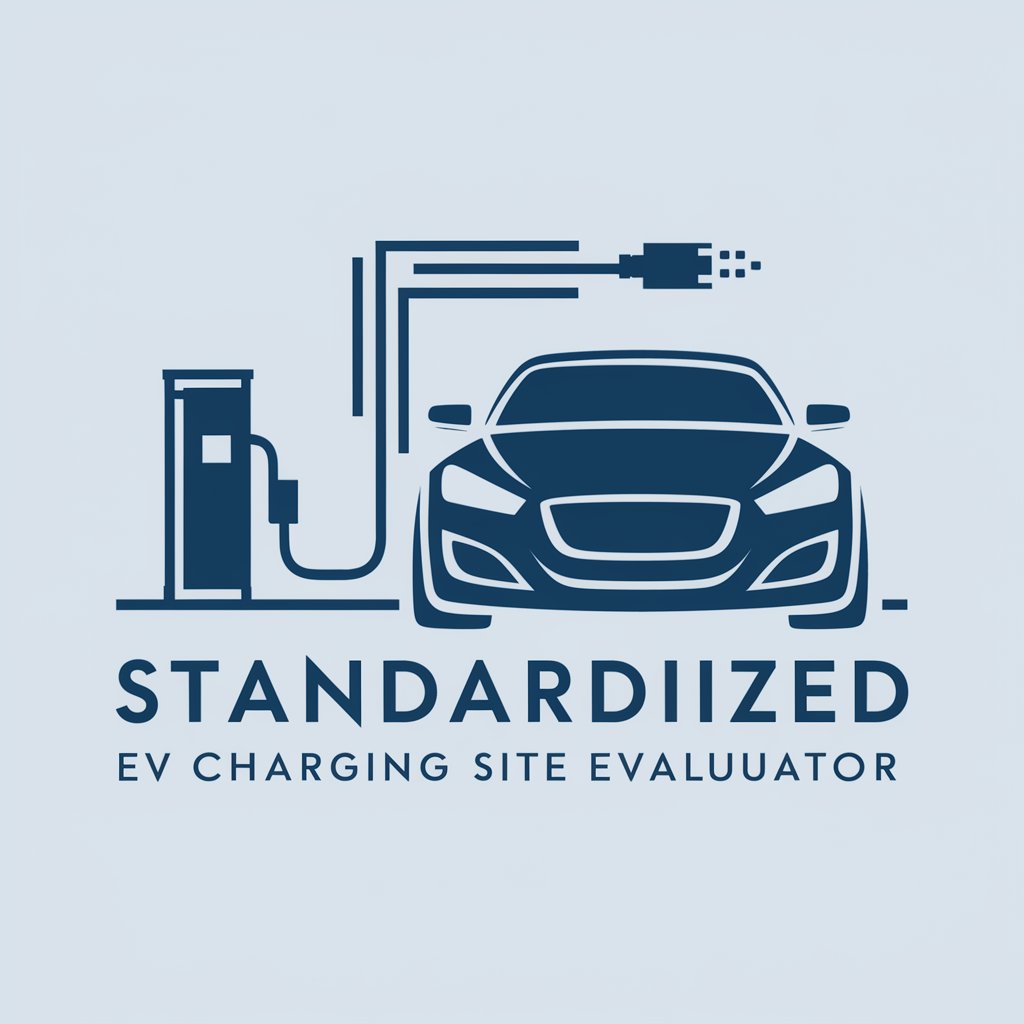EV Charging Site Evaluation & Strategy - EV Site Evaluation Tool

Welcome! Let's evaluate the best sites for EV charging stations together.
AI-powered optimization for EV charging sites
Analyze the best location for installing EV charging stations in urban areas.
Evaluate the suitability of a rural site for EV charger deployment based on current infrastructure.
Assess the demand for EV charging stations in high-density residential neighborhoods.
Determine the optimal type of EV chargers for a given location based on demographic and EV registration data.
Get Embed Code
EV Charging Site Evaluation & Strategy Overview
The Electric Vehicle (EV) Charging Site Evaluation & Strategy tool is designed to assess the viability and strategic value of different locations for the installation of EV charging stations. This tool uses a comprehensive scoring algorithm that incorporates a variety of factors, including local demographics, existing EV density, infrastructure readiness, types of chargers suitable for the area, proximity to key amenities, and points of interest. The primary goal is to identify optimal sites for EV chargers that can serve the maximum number of users efficiently, enhance the EV charging network, and support the transition to electric mobility. An example scenario includes evaluating a site in a suburban area with rising EV ownership to determine if it should host a fast-charging station to cater to commuters or a level 2 charging station for local residents. Powered by ChatGPT-4o。

Core Functions and Real-World Applications
Location Suitability Analysis
Example
Assessing a location's potential based on demographic data, EV registration trends, and existing charging infrastructure. For instance, analyzing a zip code in Texas with high EV registrations but low charger density to identify it as a high-priority area for new installations.
Scenario
A municipality looking to expand its EV infrastructure to areas with the highest need and potential for utilization.
Charger Type Recommendation
Example
Determining the most appropriate type of EV charger (e.g., Level 2, DC Fast Charger) for a location based on current and anticipated EV traffic and usage patterns. This might involve recommending DC Fast Chargers for locations near highways to serve long-distance EV travelers.
Scenario
A retail chain planning to install EV chargers at its locations nationwide, seeking to understand the best charger types to accommodate its customers' needs.
Infrastructure Readiness Assessment
Example
Evaluating the existing electrical and physical infrastructure of a site to identify any upgrades needed to support EV charging stations. This could include assessing power supply, parking space availability, and accessibility.
Scenario
A real estate developer evaluating different properties for the feasibility of integrating EV charging stations into new residential projects.
Target User Groups
Municipal and Government Planners
These users are involved in urban planning and infrastructure development. They benefit from using the services to strategically plan the expansion of EV charging networks in their jurisdictions, ensuring equitable access and supporting sustainability goals.
Commercial Real Estate Owners and Retailers
Owners of shopping centers, office buildings, and other commercial properties use the tool to assess the feasibility and strategic advantages of adding EV charging stations to their premises, enhancing property value and attracting EV drivers as customers.
EV Charging Network Operators
Operators looking to expand their network benefit from detailed site evaluations to optimize their investment, ensuring new stations are located where they will be most used and profitable, taking into account future trends in EV adoption.

Guidelines for Using EV Charging Site Evaluation & Strategy
Start Free Trial
Begin by visiting yeschat.ai to explore the tool with a free trial, no login or ChatGPT Plus subscription required.
Understand Your Needs
Identify your specific requirements for EV charging site evaluation, including location, type of chargers, and expected user demographics.
Gather Data
Collect relevant data such as local EV registrations, demographic information, and existing charging infrastructure, leveraging our uploaded knowledge sources.
Use the Tool
Input your collected data into our tool to analyze potential sites based on demographics, EV density, and other critical factors.
Review Results
Examine the tool's output for site scores and recommendations, considering our comprehensive evaluation for optimal decision-making.
Try other advanced and practical GPTs
Write Better GPT
Elevate Your Writing with AI

SEO Video Maestro
Optimize Your YouTube Presence with AI-Powered SEO

Open Source License Classifier
Classify licenses with AI precision

AudienClature
Elevating Angular projects with AI

XANA Genesis 志紀ちゃんとデート
Virtual dates with AI-powered anime charm

AGE DETECTOR BY ARCritic
Discover age through words with AI

Good Alternative Hunter
Discover quality for less, powered by AI.

Regenerative Medicine Advisor
Empowering regenerative medicine with AI

Precision Medicine Advisor
Empowering Precision Medicine with AI

Beyond The Mirror - views from everywhere & one
Explore every angle with AI-powered insights

Twine
Craft Engaging Stories with AI

Mind Your Manners
Politeness meets AI: Enhance your manners

FAQs on EV Charging Site Evaluation & Strategy
What makes this tool unique for evaluating EV charging sites?
Our tool integrates detailed demographic data, EV registration counts, and sophisticated algorithms to provide a comprehensive analysis for optimal site selection, unique in its depth and breadth of consideration.
Can the tool evaluate sites for different types of EV chargers?
Yes, it supports evaluation for various charger types, including Level 2 and DC fast chargers, tailoring recommendations to specific charging speeds and user needs.
How does the tool handle data on EV registrations and demographics?
It utilizes uploaded datasets on EV registrations and demographic information by ZIP code, offering a nuanced analysis that considers local EV adoption and population characteristics.
Is this tool suitable for use by municipal planners?
Absolutely, municipal planners can leverage the tool to strategize public charging infrastructure, ensuring it meets the needs of the community and supports EV adoption.
How can private businesses benefit from this tool?
Businesses can use the tool to identify lucrative locations for charging stations, enhancing their property value and attracting EV-driving customers.
